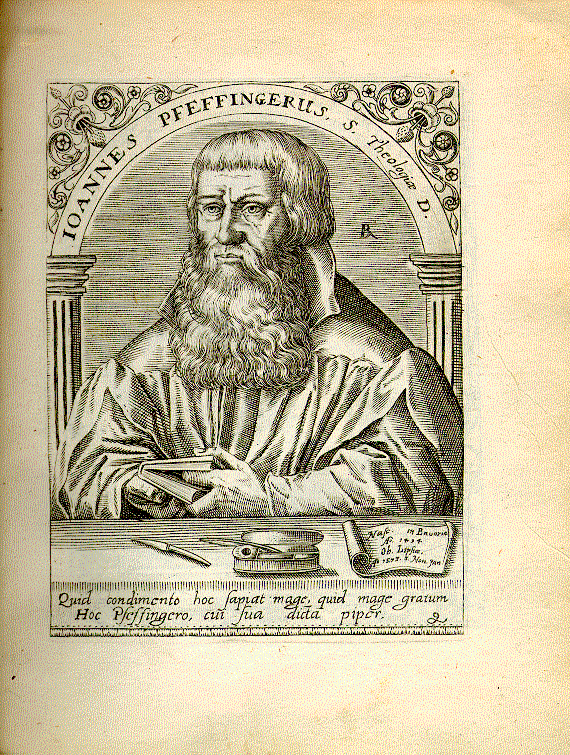
Johann Pfeffinger
Encyclopedia

His life and work
Devoting himself to the religious life, Pfeffinger became an acolyteAcolyte
In many Christian denominations, an acolyte is anyone who performs ceremonial duties such as lighting altar candles. In other Christian Churches, the term is more specifically used for one who wishes to attain clergyhood.-Etymology:...
at Salzburg
Salzburg
-Population development:In 1935, the population significantly increased when Salzburg absorbed adjacent municipalities. After World War II, numerous refugees found a new home in the city. New residential space was created for American soldiers of the postwar Occupation, and could be used for...
in 1515, and soon afterward was made subdeacon and deacon. Receiving a dispensation from the regulations concerning canonical age
Canonical age
Canonical age in Roman Catholic canon law is an age one must reach, counting from birth, when one becomes capable of incurring certain obligations, enjoying special privileges, embracing special states of life, holding office or dignity, or receiving the sacraments.Each of these human acts requires...
, he was ordained priest and stationed at Reichenhall, Saalfelden
Saalfelden
Saalfelden is a town in the Austrian state of Salzburg and is the administrative centre of the Pinzgauer Saalachtal...
, and Passau
Passau
Passau is a town in Lower Bavaria, Germany. It is also known as the Dreiflüssestadt or "City of Three Rivers," because the Danube is joined at Passau by the Inn from the south and the Ilz from the north....
, where his clerical activity soon found great approbation. Suspected of Lutheran heresy, he went to Wittenberg
Wittenberg
Wittenberg, officially Lutherstadt Wittenberg, is a city in Germany in the Bundesland Saxony-Anhalt, on the river Elbe. It has a population of about 50,000....
in 1523, where he was cordially welcomed by Martin Luther
Martin Luther
Martin Luther was a German priest, professor of theology and iconic figure of the Protestant Reformation. He strongly disputed the claim that freedom from God's punishment for sin could be purchased with money. He confronted indulgence salesman Johann Tetzel with his Ninety-Five Theses in 1517...
, Philip Melanchthon, and Bugenhagen.
In 1527 he went as parish priest to Sonnenwalde, and in 1530, when expelled by the bishop of Meissen, he removed to the monastery of Eicha, near Leipzig, where his services were attended by many outside the parish. In 1532 he went to Belgern
Belgern
Belgern is a town in the district Nordsachsen, in the Free State of Saxony, Germany. It is located on the left bank of the Elbe, 12 km southeast of Torgau and 55 km east of Leipzig....
, whence he was delegated, in 1539, to complete the Reformation in Leipzig. In 1540, he was permanently vested with the office of superintendent.
He declined calls to Halle and Breslau, though he took part in completing the work of the Reformation at Glauchau
Glauchau
Glauchau is a town in Germany, in Saxony, on the right bank of the Mulde, 7 miles north of Zwickau and 17 miles west of Chemnitz by rail. It is part of the Zwickau district....
in 1542. In his capacity of censor he prevented further printing of Schenk
Schenk
Schenk is a common German surname. It can refer to:* Several members of the Stauffenberg family* Lynn Schenk* Christian Schenk* Otto Schenk* Ard Schenk* Karl Schenk* Several members of the Salisbury family* Douglas Schenk* Steven Schenk* Jeff Schenk...
's postilla. In 1543 he was graduated as the first Protestant doctor of theology, and became a professor of theology in the following year. In 1548 he was made a canon of Meissen.
Duke Maurice of Saxony drew him into the negotiations regarding the introduction of a Protestant church constitution and liturgy. Having been appointed assessor in the Leipzig consistory in 1543, he participated, in 1545, in the consecration of a bishop of Merseburg as one of the ordaining clergy. In the following year he negotiated at Dresden with Anton Musa and Daniel Greser, and took part in the deliberations concerning the Interim at the Diet of Meissen (July, 1548), at Torgau
Torgau
Torgau is a town on the banks of the Elbe in northwestern Saxony, Germany. It is the capital of the district Nordsachsen.Outside Germany, the town is most well known as the place where during the Second World War, United States Army forces coming from the west met with forces of the Soviet Union...
(October 18), at Altzella (November), and at the Leipzig Saxon Diet (December 22). The Elector August
Augustus, Elector of Saxony
Augustus was Elector of Saxony from 1553 to 1586.-First years:Augustus was born in Freiberg, the youngest child and third son of Henry IV, Duke of Saxony, and Catherine of Mecklenburg. He consequently belonged to the Albertine branch of the Wettin family...
likewise sought formal expressions of opinion from Pfeffinger; and in this connection, in 1555, he proposed, with a view to securing religious uniformity, that the Interim liturgy of 1549 should again be used. Melanchthon, however, opposed this suggestion, holding that, were it adopted, additional religious disunion would follow.
Pfeffinger also took part in the deliberative proceedings of the delegates of the three consistories in 1556, as well as in the Dresden convention of 1571. Pfeffinger's writings were ethical, ascetic, and polemic. His Propositiones de libero arbitrio (1555) occasioned the outbreak of the synergistic strife. Against Nicolaus von Amsdorf
Nicolaus von Amsdorf
Nicolaus von Amsdorf was a German theologian and Protestant reformer.-Biography:He was born in Torgau, on the Elbe....
he wrote his Antwort (Wittenberg, 1558), Demonstratio mendacii (1558), and Nochmals grundlicher Bericht; while he opposed Matthias Flacius
Matthias Flacius
Matthias Flacius Illyricus was a Lutheran reformer.He was born in Carpano, a part of Albona in Istria, son of Andrea Vlacich alias Francovich and Jacobea Luciani, daughter of a wealthy and powerful Albonian family...
in his Verantwortung. He embodied his tenets in five articles of the Formula der Bekendnus of June 3, 1556, which he also submitted, in amplified form, to the Wittenberg theologians.

